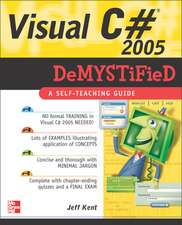Qualitative Research Methods for Psychologists: Introduction through Empirical Studies
Editat de Constance T. Fischeren Limba Engleză Hardback – 11 dec 2005
- Addresses a range of practical examples from different traditions such as phenomology, grounded theory, ethnography and discourse analysis through actual case studies
- Discusses various methodology and combinations of methods like assimilation analysis, dialogal approach, intuitive inquiry, and conceptual encounter
- Terms are defined within chapters and/or in a glossary
- Helps readers bridge from experimental to qualitative methods
- Provides in-depth, philosophically grounded, and compelling research findings
- Includes practical introduction about steps in qualitative research
Preț: 547.98 lei
Preț vechi: 679.63 lei
-19% Nou
Puncte Express: 822
Preț estimativ în valută:
104.85€ • 109.48$ • 86.78£
104.85€ • 109.48$ • 86.78£
Carte tipărită la comandă
Livrare economică 28 martie-11 aprilie
Preluare comenzi: 021 569.72.76
Specificații
ISBN-13: 9780120884704
ISBN-10: 0120884704
Pagini: 512
Dimensiuni: 152 x 229 x 29 mm
Greutate: 0.93 kg
Editura: ELSEVIER SCIENCE
ISBN-10: 0120884704
Pagini: 512
Dimensiuni: 152 x 229 x 29 mm
Greutate: 0.93 kg
Editura: ELSEVIER SCIENCE
Public țintă
Scientific researchers, academics, and research professionals in applied settings in the social sciences.Cuprins
Part I: CLINICAL PRACTICES
L. Honos-Webb, W.B. Stiles, L.S. Greenberg, and R. Goldman, An Assimilation Analysis of Psychotherapy: Responsibility for "Being There"
A. Madill, Exploring Psychotherapy with Discourse Analysis: Chipping away at the Mortar
D.L. Rennie, The Grounded Theory Method: Application of a Variant of its Procedure of Constant Comparative Analysis to Psychotherapy Research
S. Churchill, Phenomenological Analysis: Clinical Impression Formation during a Psychodiagnostic Interview
J. Goicoechea, Diagnostic Discourse in Patient-Staff Interactions: A Conversation Analysis Clarified by Participant Interviews
Part II: AFFECTIVE AND COGNITIVE PROCESSES
S.L. Morrow, Honor and Respect: Feminist Collaborative Research with Sexually Abused Women
B. Robbins, An Empirical, Phenomenological Study: Being Joyful
J. de Rivera, Conceptual Encounter: The Experience of Anger
S. Halling, M. Leifer and J.O. Rowe, Emergence of the Dialogal Approach: Forgiving Another
H.R. Pollio and M.J. Ursiak, A Thematic Analysis of Written Accounts: Thinking about Thought
Part III: LIFE SITUATIONS
V. Esbjörn-Hargens and R. Anderson, Intuitive Inquiry: An Exploration of Embodiment among Contemporary Female Mystics
A. Collen, An Application of Experiential Method in Psychology: What Is It Like to Be a Stranger in a Foreign Land
L. Levers, Focus Groups and Related Rapid Assessment Methods: Identifying Psychoeducational HIV/AIDS Interventions in Botswana
L. Honos-Webb, W.B. Stiles, L.S. Greenberg, and R. Goldman, An Assimilation Analysis of Psychotherapy: Responsibility for "Being There"
A. Madill, Exploring Psychotherapy with Discourse Analysis: Chipping away at the Mortar
D.L. Rennie, The Grounded Theory Method: Application of a Variant of its Procedure of Constant Comparative Analysis to Psychotherapy Research
S. Churchill, Phenomenological Analysis: Clinical Impression Formation during a Psychodiagnostic Interview
J. Goicoechea, Diagnostic Discourse in Patient-Staff Interactions: A Conversation Analysis Clarified by Participant Interviews
Part II: AFFECTIVE AND COGNITIVE PROCESSES
S.L. Morrow, Honor and Respect: Feminist Collaborative Research with Sexually Abused Women
B. Robbins, An Empirical, Phenomenological Study: Being Joyful
J. de Rivera, Conceptual Encounter: The Experience of Anger
S. Halling, M. Leifer and J.O. Rowe, Emergence of the Dialogal Approach: Forgiving Another
H.R. Pollio and M.J. Ursiak, A Thematic Analysis of Written Accounts: Thinking about Thought
Part III: LIFE SITUATIONS
V. Esbjörn-Hargens and R. Anderson, Intuitive Inquiry: An Exploration of Embodiment among Contemporary Female Mystics
A. Collen, An Application of Experiential Method in Psychology: What Is It Like to Be a Stranger in a Foreign Land
L. Levers, Focus Groups and Related Rapid Assessment Methods: Identifying Psychoeducational HIV/AIDS Interventions in Botswana
Recenzii
"...a rich, multi-layered book...I would particularly recommend this book as a teaching tool to use on post-graduate courses exploring qualitative methodology and psychotherapy." --Linda Finlay for QUALITATIVE RESEARCH IN PSYCHOLOGY, Volume 3, Number 4, 2006
"Fischer (Duquesne University) brings together experienced researchers to introduce students to the methods of qualitative research. In her introduction, she defines qualitative research, discusses how it compares with quantitative research, and looks at the types of questions such research attempts to answer. She also provides information on practical issues, from picking topics to publishing. Students will particularly appreciate the annotated sources at the end of the introduction, the chapter of frequently asked questions, and the helpful glossary. The 13 chapters include case demonstrations of different approaches to studying clinical practices, affective and cognitive processes, and life situations. Each chapter includes methodology and rationale, biographical information on the author(s), and an introduction explaining the focus of the chapter and how the content fits within the broader text. Throughout readers will observe the reflective processes involved in conducting qualitative research. This will be a valuable source on methods used to conduct phenomenological research. Summing Up: Recommended. Upper-division undergraduates through faculty and professionals." --C. J. Speaker, Elmira College for CHOICE, July 2006
"Fischer (Duquesne University) brings together experienced researchers to introduce students to the methods of qualitative research. In her introduction, she defines qualitative research, discusses how it compares with quantitative research, and looks at the types of questions such research attempts to answer. She also provides information on practical issues, from picking topics to publishing. Students will particularly appreciate the annotated sources at the end of the introduction, the chapter of frequently asked questions, and the helpful glossary. The 13 chapters include case demonstrations of different approaches to studying clinical practices, affective and cognitive processes, and life situations. Each chapter includes methodology and rationale, biographical information on the author(s), and an introduction explaining the focus of the chapter and how the content fits within the broader text. Throughout readers will observe the reflective processes involved in conducting qualitative research. This will be a valuable source on methods used to conduct phenomenological research. Summing Up: Recommended. Upper-division undergraduates through faculty and professionals." --C. J. Speaker, Elmira College for CHOICE, July 2006






